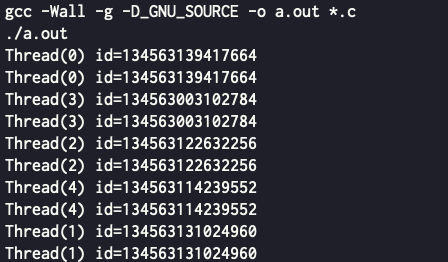TL;DR §
#include <stdio.h>
#include <pthread.h>
#include <stdlib.h>
void* thread_func(void* arg);
int main() {
pthread_t threads[5];
int in[5];
int* out;
for (int i = 0; i < 5; i++) {
in[i] = i;
if(pthread_create(threads + i, NULL, thread_func, (void*)(in + i)) != 0) {
printf("Thread (%d) failed to create.\n", i);
}
}
for (int i = 0; i < 5; i++) {
if(pthread_join(threads[i], (void**)&out) != 0) {
printf("Thread (%d) failed to join.\n", *out);
}
free(out);
}
return 0;
}
void* thread_func(void* arg) {
pthread_t tid = pthread_self();
int* id = malloc(sizeof(int));
*id = *((int*)arg);
for (int i = 0; i < 2; i++) {
printf("Thread(%d) id=%lu\n", *id, tid);
}
pthread_exit(id);
}

- 간단한 설명:
- 일단 기본적으로
pthread.h 를 추가해 줘야 한다.
- Thread 에 인자를 넣어줄 때는
pthread_create() 의 4번째 인자를 활용하면 된다.
- 하나밖에 못넣으니까 여러개를 넣고자 한다면 구조체 를 활용하자.
- 안넣고 싶으면
NULL 을 박으면 된다.
- Thread 에서 결과를 받을 때는
pthread_join() 의 두번째 인자를 활용하면 된다.
- 다만 주의할 것은 double void pointer (
void**) 라는 것.
- Thread 내에서 보내주는 값은
pthread_exit() 에 넣어주면 된다.
- 여기에는 pointer 를 넣어주는데, 동적할당된 pointer 여야 한다.
- 아니면 thread function 삭제시 stack record 가 날라가며 이상한 값이 들어올 수 있다.
- 그리고 이놈에 대한 할당 해제는
main() 에서 값을 받은 다음에 해주면 된다.
- 어차피 해당 변수에 동적할당된 공간의 주소가 적혀있을 것이기 때문.
- 안받고 싶으면
pthread_join() 이나 pthread_exit() 둘 다 NULL 을 박으면 된다.
- Thread 내에서 본인의 ID 를 알고 싶으면
pthread_self() 를 이용하면 된다.
- 반환 자료형은
pthread_t 이고
- Formatting 할 때는
%lu (unsigned long) 으로 해주면 된다.
